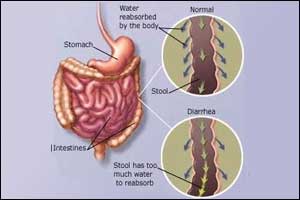- Home
- Editorial
- News
- Practice Guidelines
- Anesthesiology Guidelines
- Cancer Guidelines
- Cardiac Sciences Guidelines
- Critical Care Guidelines
- Dentistry Guidelines
- Dermatology Guidelines
- Diabetes and Endo Guidelines
- Diagnostics Guidelines
- ENT Guidelines
- Featured Practice Guidelines
- Gastroenterology Guidelines
- Geriatrics Guidelines
- Medicine Guidelines
- Nephrology Guidelines
- Neurosciences Guidelines
- Obs and Gynae Guidelines
- Ophthalmology Guidelines
- Orthopaedics Guidelines
- Paediatrics Guidelines
- Psychiatry Guidelines
- Pulmonology Guidelines
- Radiology Guidelines
- Surgery Guidelines
- Urology Guidelines
Updated BSG Guidelines for chronic diarrhoea in adults

Chronic diarrhoea is a common problem, hence clear guidance on investigations is required. This is an updated guideline from 2003 for the investigations of chronic diarrhoea commissioned by the Clinical Services and Standards Committee of the British Society of Gastroenterology (BSG). This document has undergone significant revision in content through input by 13 members of the Guideline Development Group (GDG) representing various institutions. The GRADE system was used to appraise the quality of evidence and grading of recommendations.
Key recommendations :
Clinical assessment
- We recommend a careful detailed history to plan investigations (Grade of evidence level 1, Strength of recommendation strong).
- We recommend screening blood tests for the exclusion of anaemia, coeliac disease, etc as well as stool tests for inflammation (Grade of evidence level 1, Strength of recommendation strong).
- We recommend making a positive diagnosis of irritable bowel syndrome (IBS) following basic blood and stool screening tests (Grade of evidence level 2, Strength of recommendation strong).
Cancer or inflammation
- We recommend excluding colorectal cancer in those with altered bowel habit±rectal bleeding by colonoscopy (Grade of evidence level 1, Strength of recommendation strong).
- We suggest use of testing for faecal blood loss by faecal immunochemical testing in primary or secondary care, either as an exclusion test or to guide priority of investigations in those with lower gastrointestinal symptoms (chronic diarrhoea) but without rectal bleeding (Grade of evidence level 2, Strength of recommendation weak).
- Faecal calprotectin is recommended to exclude colonic inflammation in those suspected with IBS and under the age of 40 (Grade of evidence level 1, Strength of recommendation strong).
Secondary clinical assessment
- If symptoms persist despite normal first-line investigations and treatment, then referral for further investigations is recommended (Grade of evidence level 5, Strength of recommendation strong).
- We recommend blood and stool tests to exclude malabsorption and common infections (especially in the immunocompromised or elderly) (Grade of evidence level 2, Strength of recommendation strong).
Common disorders
- In those with functional bowel or IBS-diarrhoea, a positive diagnosis of bile acid diarrhoea should be made either by75SeHCAT testing or serum bile acid precursor 7α-hydroxy-4-cholesten-3-one (depending on local availability) (Grade of evidence level 1, Strength of recommendation strong).
- There is insufficient evidence to recommend use of an empirical trial of treatment for bile acid diarrhoea rather than making a positive diagnosis (Grade of evidence level 5, Strength of recommendation strong).
- We recommend colonoscopy with biopsies of right and left colon (not rectal) to exclude microscopic colitis (Grade of evidence level 1, Strength of recommendation strong).
Malabsorption
- If lactose maldigestion is suspected, we suggest hydrogen breath testing (if available) or withdrawal of dietary lactose/carbohydrates from the diet (Grade of evidence level 3, Strength of recommendation weak).
- MR enterography is recommended for evaluation of small bowel abnormalities depending on availability (Grade of evidence level 1, Strength of recommendation strong).
- Video capsule endoscopy (VCE) is recommended for assessing small bowel abnormalities depending on local availability (Grade of evidence level 1, Strength of recommendation strong).
- We do not recommend small bowel barium follow through or barium enteroclysis for the evaluation of small bowel abnormalities due to its poor sensitivity and specificity (Grade of evidence level 5, Strength of recommendation strong).
- We recommend enteroscopy only for targeted lesions identified by MR enterography or VCE and not for diagnosis of chronic diarrhoea (Grade of evidence level 4, Strength of recommendation strong).
- We recommend faecal elastase testing when fat malabsorption is suspected. We do not recommend PABA testing (Grade of evidence level 1, Strength of recommendation strong).
- MRI (rather than CT) is recommended for assessing structural anomalies of the pancreas in suspected chronic pancreatitis (Grade of evidence level 2, Strength of recommendation strong).
- If small bowel bacterial overgrowth is suspected, we recommend an empirical trial of antibiotics as there is insufficient evidence to recommend routine hydrogen or methane breath testing (Grade of evidence level 3, Strength of recommendation strong).
Surgical and structural disorders
- We recommend use of anorectal manometry and endoanal ultrasound only when other local pathology has been excluded and conservative measures exhausted (Grade of evidence level 3, Strength of recommendation strong).
- We recommend radiological modalities for the investigation of fistulae—MRI or CT with contrast follow through (Grade of evidence level 3, Strength of recommendation strong).
Rare causes
- Diarrhoea due to hormone-secreting tumours is rare, hence we recommend testing only when other causes of diarrhoea have been excluded (Grade of evidence level 4, Strength of recommendation strong).
British Society of GastroenterologyDiarrhoeaguideline development groupinflammationIrritable Bowel Syndromestool screening tests
Source : Press ReleaseNext Story
NO DATA FOUND

Disclaimer: This site is primarily intended for healthcare professionals. Any content/information on this website does not replace the advice of medical and/or health professionals and should not be construed as medical/diagnostic advice/endorsement or prescription. Use of this site is subject to our terms of use, privacy policy, advertisement policy. © 2020 Minerva Medical Treatment Pvt Ltd